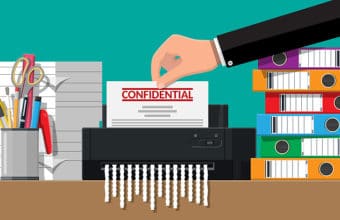Document Shredding
-
How to Properly Dispose of Legacy Paper Records
Legacy records management is one of the most challenging parts of information management for any organization. Legacy records can be buried, commingled with important documents, and hard to find. In some cases, organizations inherit records, which can make the process even more complicated. No matter what state the records system is in, it is important […]
read more -
The FACTA Disposal Rule: What Does It Mean for Your Business?
Businesses have a lot to consider when protecting their company and client data. No one wants to be subjected to identity theft due to lax data protection policies. To better protect consumers, the Fair and Accurate Credit Transaction Act (FACTA) was established in 2003. This act provides specific rules on how personal and company data […]
read more -
When Can You Safely Dispose of Legal Paperwork?
You have a collection of legal documents gathering dust in your office. Should you shred them? That’s a sticky question. Legal records may contain sensitive information. If you dispose of them, you reduce the risk of having the wrong people gain unauthorized access. Then again, you don’t ever want to dispose of anything that you […]
read more -
Are Recordkeeping Requirements the Same for All Businesses?
One of the first decisions any new company must make is how to keep records. From measuring the operation’s profit margins to verifying that everything is in accordance with IRS tax requirements, accurate recordkeeping is critical to your company’s success. Fortunately, the IRS doesn’t mandate that businesses keep records in a specific format. As long […]
read more -
How Long Do I Have to Keep Employment Records on File?
How Long Do I Have to Keep Employment Records on File? The maintenance of employment records can be a massive undertaking. For companies with a large payroll, handling employment records can be a business in itself. Regardless, a proper policy outlining the handling of employment records can be crucial in the case of an audit. […]
read more -
5 Surprising Benefits of an On-Site Shredding Service
When your company handles sensitive information, you know all about the importance of correctly disposing of material like papers and hard drives. If you fail to handle disposal correctly, you put your company and clients at risk of data theft. Using an on-site data shredding service makes data disposal easy and convenient. But you might […]
read more -
What’s Considered to Be “Unsecured” PHI?
Organizations that handle protected health information (PHI), also referred to as personal health information, have specific requirements under the Health Insurance Portability and Accountability Act of 1996 (HIPAA). One is to report “unsecured” PHI breaches to both the affected patients and the U.S. Department of Health & Human Services. Failure to do so can lead […]
read more -
Provide Value to Your Customers by Hosting an On-Site Shredding Event
Showing that you’re a part of your community and want to add value to peoples’ lives keeps your business in good standing. One way you can do this is to host a shredding event, where employees, customers, and community members can destroy sensitive data that are difficult to get rid of otherwise. The Steps to […]
read more -
Legal Review: Laws That Impact Document Shredding for Businesses
Legal Review: Laws That Impact Document Shredding for Businesses Not surprisingly, the government has some guidelines regarding document shredding. Protecting sensitive information from getting into the wrong hands is the whole point of shredding, so it can’t be done haphazardly. Also, different kinds of information have their own sets of rules regarding elimination. Beyond the […]
read more














